

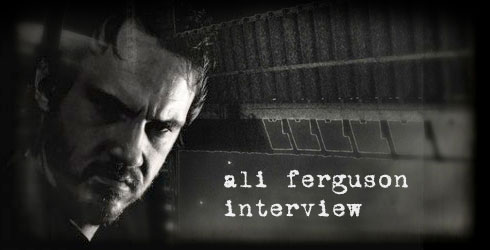
During the final rehearsals for the Ray Wilson and Stiltskin tour, GNC had the opportunity to speak with Ray Wilson's lead guitarist Ali Ferguson about his own projects, particularly his brand new album The Windmills And The Stars.
GNC: Since most of our readers will not know anything about your background other than the things they may have found on Facebook and other sites, I would like to begin with some basic questions, like where you are from and what is your education?
Ali: I'm from a little town up in Scotland called Dunfermline, not far from Edinburgh, just on the other side of the bridge. Outside Dunfermline is a tiny little village called Crossford. That's where I was born and brought up. A very small place.
GNC: What kind of education or training for a job do you have?
Ali: Uh, I've never had a proper job. I've always just played the guitar. I grew up through highschool, and I left highschool to go to music college. I didn't go into a proper job, so I've always played in bands and played for various people.
GNC: So you are a musician, and that is also your job?
Ali: Yes. It is a proper job I think. [laughs] A lot of people would disagree.
GNC: When did you start making music?
Ali: At a very young age. I was born into a very musical family. My brother is a professional – he plays the viola, classical viola, and my whole family played instruments. I started playing cello when I was five. Five to seventeen I played the cello. With a little overlap I took up the guitar at about fifteen. So, yeah, very young.
GNC: Then you started playing in bands. Were they serious outfits or hobby bands?
Ali: The first band was – I grew up, as I was saying, in the little village of Crossford which was home to a couple of guys from the band Nazareth, a heavy rock band...
GNC: „Love Hurts“.
Ali: The very same. I grew up with the sons of the bass player. We started a band when we were barely fourteen or fifteen, I think? We went round and played pubs that we weren't old enough to get into, school gigs and charity gigs and anywhere they would have us, really, playing Lynyrd Skynyrd songs, Jimi Hendrix songs, Pink Floyd songs. All cover songs. All for fun, you must think we were fourteen – it was all for fun. I think all the people in the band ended up going to musical college after that and then most of them are still making a living from music. It was in the blood. Dunfermline and Crossford was a strange place because they were small towns but with a good music scene. Big Country are from Dunfermline as well. There's always been a strong music scene there.
GNC: How did you get in touch with Ray, and how did you get the job?
Ali: Basically, Lawrie and Ashley [Macmillan], who are also from just outside Dunfermline – we played together. We didn't know each other very well, but we knew of each other and when Ray was looking for a guitarist for the band he asked Lawrie and Ashley for recommendations and I was the one they mentioned, nicely.
GNC: Were you the only one?
Ali: I don't know! [laughs] To be honest, you must ask them.
GNC: You didn't do an audition or something?
Ali: I went along [with Lawrie and Ashley], met Ray and played for a few songs with them. I actually met him possibly a year or so before they recommended me for the job and that ended up falling through and, I think, Steve came back and did the tour that he was asking me for. A couple of years later when Steve left the band again he [Ray] got back in touch with me and asked me to come and play. That was just before the World Of Genesis tour that we did in the UK, a sort of theatre tour.
GNC: So you took over Steve's part in the band when he left. Now he's back, of course, so how do you share the guitar work? Do you play in another style than he does? What's your take as a guitarist on that?
Ali: Steve has done the acoustic gigs with Ray. They've always done that, the two of them, throughout the years. That was quite natural for them. I think when we play in a band, when there's just the two of us I do most of the lead work and Steve plays mostly rhythm guitar and backing vocals. It is fairly obvious, I think, which parts we will play. I'll do, as I said, mostly lead stuff. And it's … three guitar's nice.
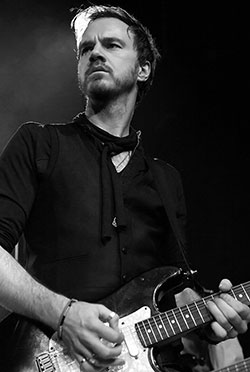 GNC: You also did the acoustic duo thing with Ray for a while.
GNC: You also did the acoustic duo thing with Ray for a while.
Ali: Yeah.
GNC: People are starting to miss that as they were very good shows...
Ali: Are they? They were good shows, yeah. I think he likes to keep things fresh and change things, line-ups and do the acoustic things. I actually had to back out of the acoustic gigs because I was away so much. I had a young baby at the time. It came to a point where I was just away too much and I had to pull back from it. I think that's when the Genesis Classic project came along at the same time. It seemed the obvious thing to do was to stop playing the acoustic gigs and... You know what it's like with Ray, he tours constantly. [laughs]
GNC: He is always unfulfilled...
Ali: That's it. He never stops.
GNC: You brought in Wish You Were Here by Pink Floyd into the live set, and you're also singing the song. Was that your idea?
Ali: It was Ray's idea, actually. I think he just wanted a break. He brought in one for Steve to sing, too. I think he wanted someone else to sing as it brought a kind of dynamic to the show.
GNC: So he could have a break.
Ali: Possibly, yes. Basically he just said, 'What would you sing if I asked you to sing a cover?', and I said, 'Well, Wish You Were Here is the obvious one.' I've always sung that, it's one of my favourite songs, and it works well within the acoustic setting when we first started doing it. It was nice for the acoustic thing. I don't think we'll be doing it now. It served the purpose of the theme.
GNC: You have played in many different line-ups with Ray. Do you have a favourite?
Ali: It depends. Sometimes it's great to play, you know, really heavy stuff, the stuff we're playing today. It's great fun. But you know I am a kind of relaxed person and sometimes that's a bit too much for me. I'm a big Genesis fan as well, so I like some of the classic stuff. I like the string parts, coming from a classical background. So it depends. They've all got their strengths, the projects.
GNC: When did you begin to write songs of your own?
Ali: I suppose I started writing my own songs … not that long ago, a few years, maybe five or six. We had a shot when we were fourteen, fifteen years old, but we didn't come up with very much good stuff. I seriously started writing … I wrote a lot, and I was in an original band with the Agnew brothers again, and I wrote a lot of stuff, co-wrote a lot of stuff with them. After that – I'd say it was probably only six or seven years ago that I started writing my own – not necessarily songs, but my own music, instrumental stuff and the ambient things I am a big fan of.
GNC: So what is the oldest track on the new album?
Ali: The oldest track... there's quite a few of them that I've written a while ago. [falls silent] Good question. I think Coincidence Is No Accidence is probably the oldest.
GNC: That's my favourite.
Ali: Most people say that. It's the most song-like of the album.
GNC: Flickering Golden and Bending Bullets also.
Ali: Yeah. I think that was the first one I wrote a while ago now. It's been changed a lot over the passing couple of years.
GNC: Your new album is, obviously, your first. Do you see it as a one-off project?
Ali: No, no. I'd like to continue to do it, yeah. I just wasn't sure if anybody would be interested in it, really. Turns out they are, so that's great. I'm already recording things in my head and on my little phone to remember stuff. And it won't take as long as this one took. I promise that.
GNC: What's the idea behind the album title? Windmills and stars do not have a lot in common, I think.
Ali: It was the first I thought of, really. The windmill was – we spent a lot of time just in tour buses and vans just driving round Europe, and I listened to a lot of ambient music while we were driving and travelling. I was probably one day listening to some Brian Eno and seeing the turbines of a wind farm. I think that's where it first came from.
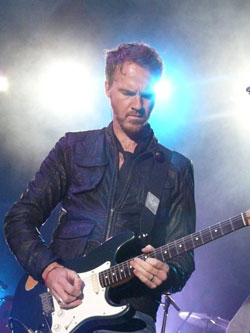 GNC: So there is not a concept behind it that recurs in the songs, or a secret you're hiding...?
GNC: So there is not a concept behind it that recurs in the songs, or a secret you're hiding...?
Ali: No. That's a great idea, I like it. I'll do that next time, a little hidden thing. No, not as such. There is a little bit of concept running through the album, but it's not, I would say, a cohesive concept album like Dark Side Of The Moon.
GNC: It sounds a bit like Pink Floyd, really.
Ali: Well, you can't avoid it. They are my heroes.
GNC: Are you pleased with the feedback you've received so far?
Ali: Very much so.
GNC: What kind of criticism have you received?
Ali: The criticism is kind of expected. It's that it is maybe a little bit one-paced, which … you know, it's that sort of album. Some people don't like birdsong. But I'm a big fan of it. In general, the feedback's been fantastic. Really good. Much better than I could have expected or hoped for. Everybody I've contacted about the album has been really interested in it and been really supportive and helpful.
GNC: You've released it on Bandcamp. Did you use that platform to keep it really simple?
Ali: Yes. It's becoming bigger and bigger now, Bandcamp. It is a very easy and, as you see, simple forward way for independent artists to release music. There's no middle man. They take – there's no middle man – Bandcamp take fifteen percent, I think, of each sale, and then the rest goes straight to the artist.
GNC: That's just the other way round than it is in iTunes!
Ali: Exactly, yeah. I mean I've put it up on iTunes because people expect it to be there but Bandcamp is much better for both the consumer and the artist. It's a really good site. I've been really impressed with it. You can sell physical CDs, T-shirts on it as well.
GNC: Do you intend to release the album on CD as well?
Ali: I do indeed. In fact it is in the pressing plant as we speak, and I should have a limited run of them next week, Tuesday.
GNC: So, 200,000 copies only...
Ali: 200,000 take it small. I aimed low. (laughs) - No, but definitely, it makes sense to have them available at concerts on the merch stall. I agree – I'd rather have the CD than the download as well. It's just I don't have a lot of funds behind me or a record company. It costs money to print them. So it made sense for me to do it download only to start with.
GNC: Could you introduce the musicians that are on the album that may not be familiar to Ray Wilson fans?
Ali: Sure. There's obviously Lawrie, who will be familiar. He plays bass on one track. The bass player on all other tracks is Chris Agnew, son of Pete Agnew of Nazareth. I've known him for … We were born two days apart in the same hospital. We've been best friends ever since. I've grown up playing music with him, so he seemed an obvious choice to have on the album. Liam Saunders is a keyboard player again from the Dunfermline area that I've grown up playing with. I brought him in. I am no keyboard player, I can't play the piano. I played parts in a lot of the ambient stuff myself, but when it came to actual piano parts or organ, Hammond organ parts I thought I'd get someone who can actually do it, so I asked Liam to come and do that. And Kim [Shepherd] is a singer in a band that Lawrie plays with back home. She fronts the band he is in and has a nice, lovely voice. I needed some female backing vocals in a couple of tracks. She was available so... I think that's it.
GNC: What about the drummer?
Ali: The drummer, yeah, he's a good friend of mine. I've known him for years. (laughs) It's actually, strangely – obviously you realize that there are no live drums on it. It's a programme I programmed myself. It's called EZdrummer, and Ray has used it in the past as well. Strangely, the person that records all the samples for it is Nir Z. So there you go. It's him who records all the sounds for Ezdrummer. That's what he does.
GNC: So I assume you decided against a real drummer for practical and financial reasons.
Ali: Yes. Both. Practical reasons mostly. I have many friends who are great drummers that would have done it out of the goodness of their hearts. But to record a live kit you need studio, a proper studio, proper mikes. At the time the album was being recorded in between tours with Ray and sitting in my house, wherever I happened to have my computer the studio would be set up at the time. I like the loops, I like the drum loops. They make nice stuff, you know, like Peter Gabriel does with Secret World and things, run three loops. I like that sound so it never really bothered me, to be honest. But it would be fun to do it live with a proper drummer. I always plan on having a real drummer live.
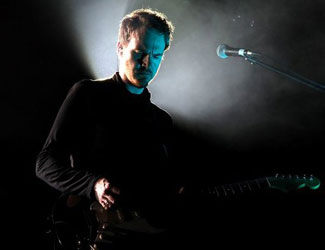 GNC: You've dedicated the album to your father. Is there a story behind that that you can relate?
GNC: You've dedicated the album to your father. Is there a story behind that that you can relate?
Ali: It's not much of a story. My dad died when I was young, when I was seven, but I still see him as an influence. He was a conductor of small, local orchestras and sang in a choir, so it was kind of his fault that music was always around when I was growing up. So it felt fitting to dedicate it to him.
GNC: You yourself are a father now. Is it difficult for you to be on the road and be a father at the same time?
Ali: It is. Yes, it is very difficult. It's a fine line because, as I said, it's all I've ever done, it's the only job I've ever had. But it would be nice to be home a bit more, I think.
GNC: It is not an option to take them with you?
Ali: No, not at the moment. The van's not big enough. Once we've got our private jet they can come with it.
GNC: If the album does well – do you want to play solo shows?
Ali: Sure. I'd love to do that. If people would like to hear it I'd love to do it. It's something I'd definitely look at, trying to do a few at home, and a few here, if anyone's interested.
GNC: You said you are fan of Genesis and Peter Gabriel. This next question may be a bit odd – if you had to record a duet and had three wishes for a duet partner, who would it be?
Ali: Woah, that's tricky. To sing with me or play the guitar? To sing... [pauses] Can't have someone too good 'cause I'd look bad. Hmmmm.... I may have to think about it and come back to it.
GNC: Have you ever thought about moving away from Scotland since you are touring so much in Poland and Germany?
Ali: I have thought about moving away from Scotland but not to Poland or Germany. To Sweden we would go because my wife is Swedish. We have family there. So the answer is yes, but … I love Poland and I love Germany as well, but it would make no sense: We'd both be moving away from family then.
GNC: Are you promoting your album in the UK, too, or are you focusing on the surroundings of Ray's shows?
Ali: I'm trying to do anything I can, really. I'm using online means, Facebook and e-mailing people. I got a good review from a Dutch progressive rock site, one in Denmark. So it is a few people who've heard it in different places. It seems to be prog rock websites that pick it up, obviously through Ray's connections and stuff.
GNC: Do you have any expectations, like, I want this number of downloads? And may we ask, without any mentioning of actual numbers, if the acceptance has reached that level?
Ali: I don't I had any idea whatsoever, to be honest, who would buy it or how many people were going to buy it. It's not been thousands and thousands of people that have bought it but the fact that anybody bought it, that anybody was interested... I made it because I like it. That is the bottom line. And I'm glad other people do as well, as it turned out. No, I had no expectations and certainly no target I was going to hit. But it is nice that it has sold a few and that it had enabled me to press a few CDs of it. Progress, perhaps, is the idea.
GNC: You co-wrote Frequency with Ray for his Propaganda Man album. Did it just happen or was it a plan both of you had?
Ali: We put this down when he was still living in Edinburgh, I think, at his house. We had gone over a few ideas for the Propaganda Man album, as it turned out to be, and he asked if I had anything, and I had the first verse and the chorus chords, I think, and he came up with the chorus melody and it came from there, really. I think he took it away and sat with it and wrote some words for the second verse...
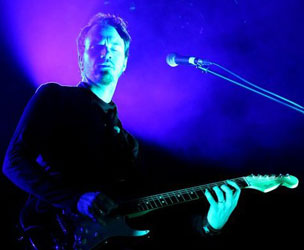 GNC: So you didn't have that finished song that was to be on The Windmills And The Stars?
GNC: So you didn't have that finished song that was to be on The Windmills And The Stars?
Ali: No. At the time – I've got a habit just writing, not writing songs, just writing little bits of a verse there and record it on the phone somewhere and the chorus somewhere else. I've got to sit down and go through them all one by one and go „Oh yeah, I remember that“. On my phone there are fifty different recordings. I've got no idea what they are but I will go back and sit and listen to them all, take what's good and throw the rest away.
GNC: What about lyrics? Do they come easily to you or do you find it difficult to come up with them?
Ali: They don't come easily, no. The songs on The Windmills And The Stars are not particularly wordy songs, there's not lots and lots of words to them. I tend to write... I remember Ray saying he kinda wrote – he was talking about Phil Collins, that he wrote as well like that with Genesis. They'd have the music and the tune would come and he'd just sing, mumble words that would eventually kind of form into some lyrics. I do a bit of that. Coincidence Is No Accidence, for instance, came from that phrase. I had that phrase in my head and wrote from there. They're all different. I wouldn't say it is easy, it doesn't flow out of me, definitely not.
GNC: What do you think about Ray's new album, and how much were you involved with the recording process?
Ali: Ray's new album... I think he's done that really well, I have to say. I wasn't involved in the writing process so much on this album. A lot of the heavier stuff is Uwe, like the SHE album, and Peter Hoff. He had some stuff written. It was more that he had the songs or the music that he kind of wrote the lyrics and the melodies on the top, and then he brought me in to play on top and come up with guitar ideas and guitar parts and little tools and melodies. It was quite cool. I like being in the studio doing that and coming up with things off the top of my head. The problem with me is that I record lots of guitar parts and then I can't remember what I've played. I have to go back and re-learn everything that I've played. I've only played them once, I never play them the same twice.
GNC: Just like Mike Rutherford. He had Daryl Stuermer to tell him what he played.
Ali: Exactly. You hire someone else to tell you what you played.
GNC: Are there any other projects on the horizon, or perhaps another band you would like to play with?
Ali: Not so much anymore. I'd like to kind of concentrate on doing my own stuff now. It seems to be the right thing to do. If I can get back and start recording again, I think I'd be stupid not to build on what I've started. And I'll continue with Ray's projects, yeah. I've played with a few other folk back home, but it is not as regular – it can't be regular with touring with Ray constantly. Nothing else. I've got a couple of collaborations coming up with classical, not classical as such - with a piano composer back home I'm going to do a sort of ambient collaboration. Again, these are things I like, but I don't know if anybody else will.
GNC: When one listens to your album it is quite easy to tell where your musical influences are. I wrote you what I think they are...
Ali: You were pretty much spot on, I think. [laughs]
GNC: … but perhaps you would like to tell everybody who your favourite bands and musicians are.
Ali: Well, the obvious one is Pink Floyd, that's a given. When I grew up I was a strange youngster. I grew up listening to things that my brother was listening to and obviously Pete Agnew was a big influence, too. There was always things like The Band and Little Feat, soul and rock stuff, Allman Brothers band, Lynyrd Skynyrd, things like that. My brother liked Dire Straits and things like that. And then I discovered Hendrix. I mean that was a big influence. Stevie Vaughan – this was actually before I discovered Pink Floyd, but through him I discovered Floyd and Peter Gabriel was a big influence. Later on it was newer bands, Sigur Ros, a lot of the ambient stuff I went back to find after I discovered it later on. Brian Eno had been around for years doing it but I never heard it when I was a teen. I went back and discovered the ambient series things. Daniel Lanois was a big influence, the producer of Peter Gabriel, and various other people. And then I became a big Joseph Arthur fan and then the interest in drum loops – there is just so much stuff.
GNC: Joseph Arthur is quite weird. He is painting pictures on stage...
Ali: Absolutely, yeah. I quite like that. Strange. But I like that.
GNC: And he puts out four CDs a year if he feels like it.
Ali: And then none the next year.
GNC: I think we're through with the questions.
Ali: I think we've covered everything pretty well. … I haven't given you an answer about the duet question.
GNC: That's okay. Thank you for the interview.
interview conducted by Christian Gerhardts
transcribed by Martin Klinkhardt

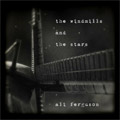


Ali Ferguson's first soloalbum is now available in digital formats.